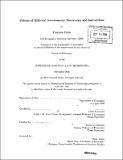Policies of different governments : persistence and interactions
Author(s)
Ricka, Frantisek
DownloadFull printable version (6.136Mb)
Other Contributors
Massachusetts Institute of Technology. Dept. of Economics.
Advisor
Guido Lorenzoni and Francesco Giavazzi.
Terms of use
Metadata
Show full item recordAbstract
This dissertation consists of three chapters on persistence and interactions of policies of different governments in various settings. Chapter 1 studies government policy persistence when firms face capital installation costs. In an environment, where the government is either left- or right-wing, the left-wing government almost always sets more right-wing policies when it follows a conservative administration than otherwise. Similarly, when the types of policy makers are close enough to each other, a right-wing government that succeeds a leftist one chooses more left-wing policies. However, when the preferences of the politicians are sufficiently different, a conservative government selects more right-wing fiscal policies when following a leftist administration in order to address the state of the economy it inherits. Chapter 2 considers the political implications of tax competition between countries of different sizes. Smaller countries competing for internationally mobile capital set lower tax rates than their larger counterparts. This is because they perceive higher elasticity of capital with respect to their policy and their governments are to the right of those elected in larger countries. Then a more significant number of small countries involved in the competition with large countries not only decreases the large-country tax rates on capital, but also shifts their governments to the right. Large countries do not have a similar "right-wing" power and the presence of more of them in a competition can actually cause a left-ward shift in the governments of the competitors. (cont.) Chapter 3 compares educational achievement of 15-year olds in post-communist versus other countries. It finds that even almost 20 years after the fall of communism, the effect of the regime and its policies seems to persist in the educational system of the Eastern Bloc countries. Students in the East achieve better in mathematics and hard sciences and worse in reading than their Western counterparts. This is likely because the communist regimes supported education in the former but stifled free and interpretive thinking necessary to achieve on the latter test. While the advantage of the East may be shrinking, its disadvantage remains the same.
Description
Thesis (Ph. D.)--Massachusetts Institute of Technology, Dept. of Economics, 2008. Includes bibliographical references (p. 119-121).
Date issued
2008Department
Massachusetts Institute of Technology. Department of EconomicsPublisher
Massachusetts Institute of Technology
Keywords
Economics.